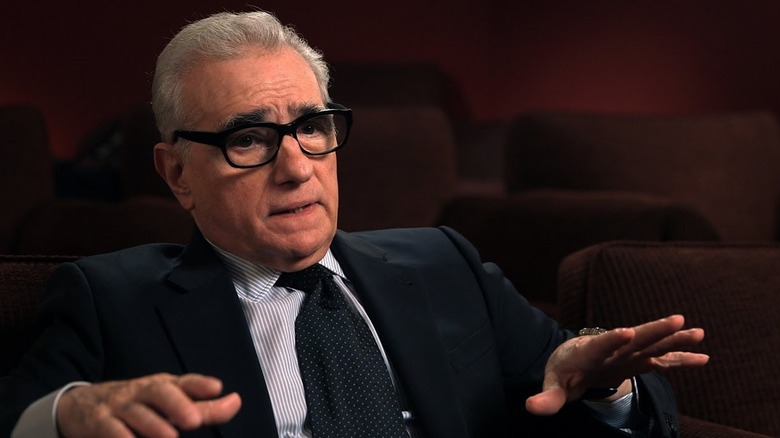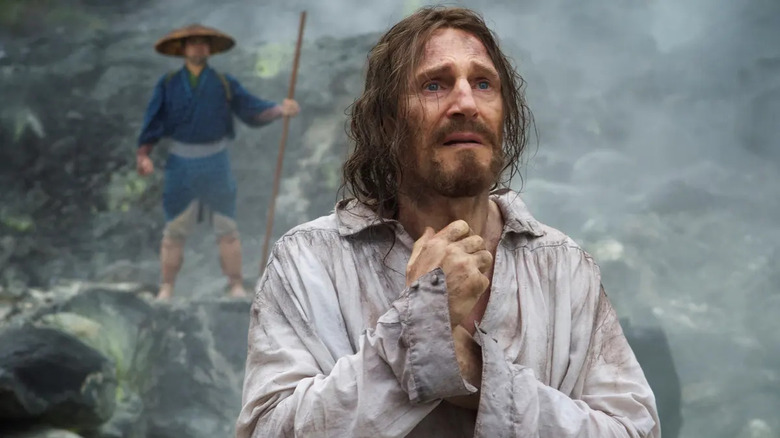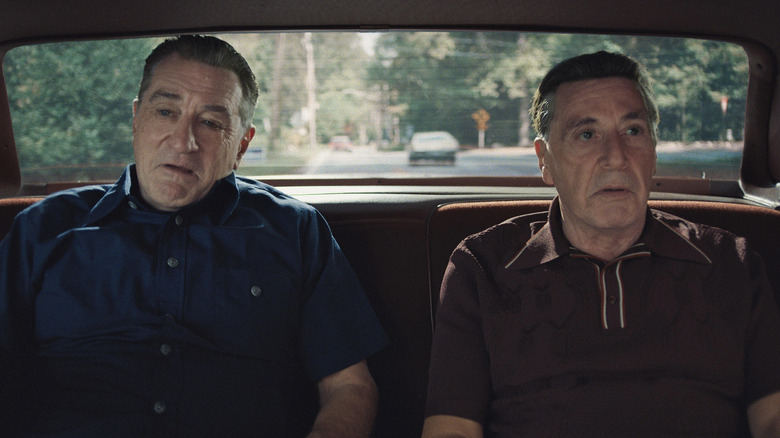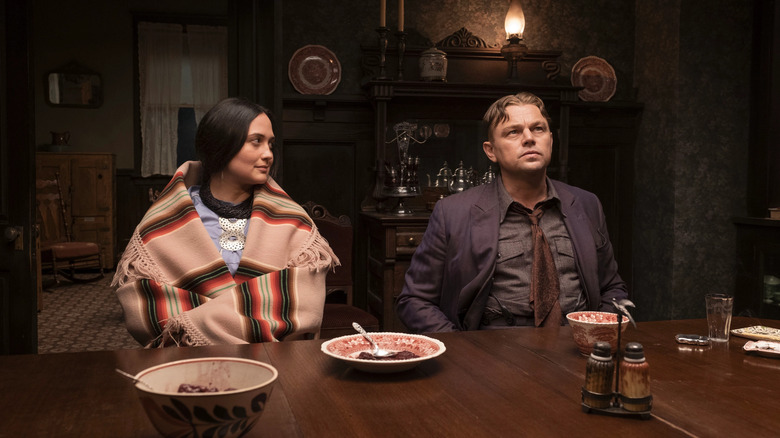Martin Scorsese Has Figured Out How To Game The Major Streamers, Making Him The Real Hero
Rejoice, cinephiles, for we are all a lot closer to seeing Martin Scorsese's "Killers of the Flower Moon." Originally set to release in 2022, the movie was pushed back a year. Now, it's been confirmed by Variety that after a premiere at the 2023 Cannes Film Festival, the film will enjoy a theatrical run, first in limited release on October 6, 2023, before going wide on October 20. The theatrical distribution comes courtesy of Paramount Pictures, but "Killers of the Flower Moon" is an Apple Studios production and will stream on Apple TV+ once its time in theaters is over.
We've written before how the hybrid release of "Killers of the Flower Moon" could be the harbinger of streaming services' new money-making strategy. The theatrical exhibition offers a direct cash return and a publicity build-up for the online release; that's something Scorsese's last picture, 2019's Netflix-produced "The Irishman" didn't take full advantage of.
Whatever the business implications, Scorsese is showing how auteurs can take advantage of streaming services. Some of the New Hollywood generation, Steven Spielberg included, are more skeptical of streaming services. However, Scorsese has used both Netflix and Apple to not only keep an endangered species alive (big-budget, non-blockbuster movies) but have them seen in theaters like cinema is meant to be.
How Marty learned to stop worrying and love Netflix
Why did Scorsese work with Netflix for "The Irishman?" In short, it was a passion project no one else would take. He'd been planning to adapt Charles Brandt's "I Heard You Paint Houses" since 2007. However, it languished in development hell due to scheduling conflicts and the requested budget (the latter was ballooned by the digital de-aging of the stars). Al Pacino (who played Jimmy Hoffa) told Variety in 2019, "I didn't think it was going to get made. At some point, I sort of thought, 'Well, that was a good idea, but a lot of those come along and never happen.'" Netflix was the only one who'd cut the check for the project.
However, if you want the full story of Scorsese's decision, look at his previous two films. 2013's "The Wolf of Wall Street" (distributed in North America and Japan by Paramount Pictures) was the greatest box office success of his career, grossing over $400 million worldwide, making back its budget 3 times over. Then in 2016, he released "Silence," an adaptation of Shūsaku Endō's novel about Catholic missionaries in 17th-century Japan. Scorsese had wanted to make "Silence" since the 1990s but struggled to do with such an uncommercial pitch. After "Wolf," he cashed in his goodwill with Paramount to finally make it.
Lightning didn't strike the box office twice. A contemplative movie about faith didn't have an audience like a debauched black comedy did, and "Silence" grossed only $23 million on a $50 million budget. After that, "The Irishman" — tonally much closer to "Silence" than "Wolf" — was too risky for Paramount. But not for Netflix; an undisclosed source at Paramount even told IndieWire that Scorsese would get more creative freedom at Netflix than he would at the studio.
Making art no matter the cost
Based on their shifting business model, Netflix may regret their investment in "The Irishman" — it cost a gargantuan $225 million and didn't even give them an Oscar winner in their catalog — but I doubt Scorsese does. While he's said he would've preferred a longer theatrical release, he got to make a passion project no one else would've funded.
I don't want to reignite the tired "Scorsese versus Marvel" controversy, but I can't recommend his New York Times op-ed, "I Said Marvel Movies Aren't Cinema. Let Me Explain," highly enough. It's so much more than the headline suggests, providing a bittersweet diagnosis of cinema's current state. After all, Scorsese isn't just a filmmaker, he's a student of the medium's history. In the op-ed, Scorsese doesn't express love for streaming services and says he prefers traditional theatrical viewing. However, he doesn't hide his work with Netflix, writing:
"I'm speaking as someone who just completed a picture for Netflix. It, and it alone, allowed us to make 'The Irishman' the way we needed to, and for that, I'll always be thankful. We have a theatrical window, which is great. Would I like the picture to play on more big screens for longer periods of time? Of course, I would."
Scorsese's goal of preserving the artistry of filmmaking is noble, but his attitude is mercenary. Despite his reservations about Netflix's impact on the film industry, he'd rather make a movie with them instead of not making it at all. That attitude is also why he hasn't hitched his wagon to just one streaming service, which has only benefited him.
Dipping into TV
We know why Scorsese is working with Netflix and their ilk, but why are they working with him? Streaming services need audiences. To get them, they need good "content," to use their euphemistic anti-art terminology. Scorsese's very name carries prestige and guarantees a quality movie. When the chance to work with him comes, streaming services will cut big checks that studios like Paramount wouldn't dare do; they already have the "content" libraries they need from decades of making movies.
If Scorsese makes movies for streaming services, it also furthers their legitimacy as Hollywood power players; Netflix was chasing an Oscar-shaped white whale with "The Irishman" and you can bet "Killers of the Flower Moon" will be up for big prizes at the 96th Academy Awards. If anything, Scorsese's deal with Apple seems to have worked out even better than his Netflix collaboration did since this film is receiving the proper theatrical release he wanted for "The Irishman."
Scorsese's deals with streaming services don't even end with films. "The Devil In The White City," which he spent a decade trying to make as a movie with Leonardo DiCaprio, almost saw the light of day as a Hulu series. He is also working on adapting "Gangs of New York" a second time, now as a TV series, with Miramax; considering the studio is owned by Paramount Global, the TV series will likely stream on Paramount+.
Scorsese has realized the most effective way to continue his crusade for cinema is to play the "content" game. The only reason I refrain from calling him the patron saint of filmmaking? The living can't be canonized. I hope Marty outlives us all and keeps doing what he loves until the end, no matter which studio or streaming service foots the bill.



